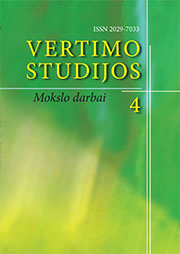TRANSLATING THE CANON: THE CHALLENGE OF POETIC FORM
TRANSLATING THE CANON: THE CHALLENGE OF POETIC FORM
Author(s): Don BogenSubject(s): Comparative Study of Literature, Translation Studies, Theory of Literature
Published by: Vilniaus Universiteto Leidykla
Keywords: Literary Translation; Canon; Literature;
Summary/Abstract: The literary translator taking on the task of rendering a major work of European poetry into contemporary English verse faces several challenges in regard to poetic form, including the problem of finding forms in English-language poetry today for conventions derived from foreign literary traditions and the need to engage the historical context of the work without sounding archaic. If a translation is to transmit the essence of a canonical text from a century or more ago, including its formal dimension, it must both convey what is distinct about the original, moving the reader toward the fundamental foreignness of the text, as Schleiermacher advised, and speak to the reader in the language of our time, because a translation that is not recognizable as good poetry in contemporary terms will not be read. This essay will compare the particular strategies of three successful but quite different contemporary translations of canonical works: Richard Howard’s version of Baudelaire’s Flowers of Evil, Robert Pinsky’s translation of The Inferno, and Seamus Heaney’s Beowulf.
Journal: Vertimo studijos
- Issue Year: 4/2011
- Issue No: 4
- Page Range: 9-17
- Page Count: 9
- Language: English

